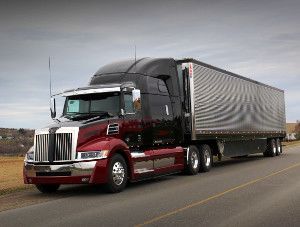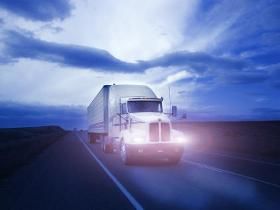In Cab Cameras On The Driver
Topic 11882 | Page 9

No offense meant to anyone here. But who would want to see any of us naked, seriously though we're not a bunch of models.
Speak for yourself. I'm sexy as hell. I get told all the time! Ar ar ar ar!! LOLLL
I think I got the gits on this at this point....pull the curtains shut when I change and when I'm stopped!

Lol, don't know about the rest of you all, but I always liked driving in my undies and I guess if my truck has a camera in it and it's rollin when I come out of the bunk oh well 




Driver facing cameras are useless if there is not one also looking out over the road. Also, what is the point of having the camera on the driver even when the truck is off?
Over The Road:
Over The Road
OTR driving normally means you'll be hauling freight to various customers throughout your company's hauling region. It often entails being gone from home for two to three weeks at a time.

No offense meant to anyone here. But who would want to see any of us naked, seriously though we're not a bunch of models.
Speak for yourself. I'm sexy as hell. I get told all the time! Ar ar ar ar!! LOLLL
I think I got the gits on this at this point....pull the curtains shut when I change and when I'm stopped!
Your looks are NOT displeasing to the eye. However I just turned 49, so MOST women are starting to be pleasing to the eye.
Dave

Rob wrote:
Driver facing cameras are useless if there is not one also looking out over the road. Also, what is the point of having the camera on the driver even when the truck is off?
That is true, it would be useless and a waste of money. The system I am most familiar with has both a forward, road-facing unit and one facing the driver. To the best of my knowledge the major carriers who have implemented a camera system have both road and driver facing units.
In addition, at least in the trucks I drive, the camera is powered-off when the ignition key is off and/or the truck is stationary (prolonged idling).
Over The Road:
Over The Road
OTR driving normally means you'll be hauling freight to various customers throughout your company's hauling region. It often entails being gone from home for two to three weeks at a time.

I want to add something for a little bit of perspective. First, please note that I spent 15 years as a litigation paralegal, and I have both employment and constitutional law experience, so I know a little of what I'm talking about. That said, this next bit is my personal opinion, bolstered by what I know of the legalities of this type of situation.
If you're a company driver, the truck is not your personal space, and you have, by law, NO reasonable expectation of privacy. Anything that occurs in or on company property, whether or not it is on personal time, is absolutely the company's business. It would be like if you worked in an office. At any time your movements and actions are monitored, either by supervisors or other senior employees overseeing a work area or workplace cameras. That includes any off time you spend at the office, like at an in-house holiday party. The same can be expected in a truck. Take into consideration that a truck is an extremely expensive piece of equipment and the company wants to make very certain that you are in no way a possible hazard to the condition of its property, or at fault when something occurs. It is not mercenary to make sure that the accident that happened was not because you decided to reach and grab something to drink out of your cooler. That's business, and they have to protect their investments, both their equipment and their drivers. Because trucking is a job where you are completely solo the driver facing cameras give the employers the ability to confirm you are doing your job. Does that seem childish and unfair? Only if you let it. It's actually good company practice, as far as I'm concerned. There are a lot of distractions in a cab when you're expected to live on it 24/7, like reaching for drinks or a snack, answering a phone (even with a headset), using the CB, checking Qualcomm , petting your dog, talking to your rider, etc. All of these things mentioned can be done safely but in the event that action corresponds with an accident the company has to protect itself, just as any brick and mortor job would fire you if you handled something in your job so as to cause a significant loss of money, reputation, or supply, not to mention bodily harm, or got overly drunk at that holiday party and acted inappropriately.
The conflict comes when the truck is shut down for the day and you're now off the clock. Technically, you still don't have an expectation of privacy in that if there is anything illegal or against company policy happening on the truck you can't claim it was "private time". However, there has to be a balance with personal privacy and really, the trucking companies understand this succinctly and are doing everything they can to make sure the balance between personal privacy and company oversight are not tipped unfavorably one way or the other. As it was mentioned before, their lawyers ran marathons to make sure the company guidelines are to the letter of the law. That said, you should be able to request a written copy of the camera policy from your employer. I do believe by law they must supply it, or at least have it on hand for viewing when requested. So you can be assured nobody is "spying" on you when you're sleeping or talking to your family when you're done for the day. Any company found to be in violation of certain privacy scenarios are in for a gigantic lawsuit, and likely won't chance it.
In all, the cameras really are there to protect both you and the company. And there's nothing wrong with the company trying to protect itself. Your best protection is to always be alert and bring your A-game to the road and you'll have nothing to worry about.
Qualcomm:
Omnitracs (a.k.a. Qualcomm) is a satellite-based messaging system with built-in GPS capabilities built by Qualcomm. It has a small computer screen and keyboard and is tied into the truck’s computer. It allows trucking companies to track where the driver is at, monitor the truck, and send and receive messages with the driver – similar to email.EPU:
Electric Auxiliary Power Units
Electric APUs have started gaining acceptance. These electric APUs use battery packs instead of the diesel engine on traditional APUs as a source of power. The APU's battery pack is charged when the truck is in motion. When the truck is idle, the stored energy in the battery pack is then used to power an air conditioner, heater, and other devices

I want to add something for a little bit of perspective. First, please note that I spent 15 years as a litigation paralegal, and I have both employment and constitutional law experience, so I know a little of what I'm talking about. That said, this next bit is my personal opinion, bolstered by what I know of the legalities of this type of situation.
If you're a company driver, the truck is not your personal space, and you have, by law, NO reasonable expectation of privacy. Anything that occurs in or on company property, whether or not it is on personal time, is absolutely the company's business. It would be like if you worked in an office. At any time your movements and actions are monitored, either by supervisors or other senior employees overseeing a work area or workplace cameras. That includes any off time you spend at the office, like at an in-house holiday party. The same can be expected in a truck. Take into consideration that a truck is an extremely expensive piece of equipment and the company wants to make very certain that you are in no way a possible hazard to the condition of its property, or at fault when something occurs. It is not mercenary to make sure that the accident that happened was not because you decided to reach and grab something to drink out of your cooler. That's business, and they have to protect their investments, both their equipment and their drivers. Because trucking is a job where you are completely solo the driver facing cameras give the employers the ability to confirm you are doing your job. Does that seem childish and unfair? Only if you let it. It's actually good company practice, as far as I'm concerned. There are a lot of distractions in a cab when you're expected to live on it 24/7, like reaching for drinks or a snack, answering a phone (even with a headset), using the CB, checking Qualcomm , petting your dog, talking to your rider, etc. All of these things mentioned can be done safely but in the event that action corresponds with an accident the company has to protect itself, just as any brick and mortor job would fire you if you handled something in your job so as to cause a significant loss of money, reputation, or supply, not to mention bodily harm, or got overly drunk at that holiday party and acted inappropriately.
The conflict comes when the truck is shut down for the day and you're now off the clock. Technically, you still don't have an expectation of privacy in that if there is anything illegal or against company policy happening on the truck you can't claim it was "private time". However, there has to be a balance with personal privacy and really, the trucking companies understand this succinctly and are doing everything they can to make sure the balance between personal privacy and company oversight are not tipped unfavorably one way or the other. As it was mentioned before, their lawyers ran marathons to make sure the company guidelines are to the letter of the law. That said, you should be able to request a written copy of the camera policy from your employer. I do believe by law they must supply it, or at least have it on hand for viewing when requested. So you can be assured nobody is "spying" on you when you're sleeping or talking to your family when you're done for the day. Any company found to be in violation of certain privacy scenarios are in for a gigantic lawsuit, and likely won't chance it.
In all, the cameras really are there to protect both you and the company. And there's nothing wrong with the company trying to protect itself. Your best protection is to always be alert and bring your A-game to the road and you'll have nothing to worry about.
Thank you. Excellent information.
One other thing I thought of that resulted from the YouTube video Doug sent yesterday; if involved in an accident, the in-cab facing camera can provide further proof the driver was safely operating without distraction.
I am sure there will be additional comments for or against and that's fine. Again this is about setting the facts, understanding how the cameras operate, and if need be, resetting the facts if there is any confusion because like it or not, use of this technology will continue to expand.
Qualcomm:
Omnitracs (a.k.a. Qualcomm) is a satellite-based messaging system with built-in GPS capabilities built by Qualcomm. It has a small computer screen and keyboard and is tied into the truck’s computer. It allows trucking companies to track where the driver is at, monitor the truck, and send and receive messages with the driver – similar to email.EPU:
Electric Auxiliary Power Units
Electric APUs have started gaining acceptance. These electric APUs use battery packs instead of the diesel engine on traditional APUs as a source of power. The APU's battery pack is charged when the truck is in motion. When the truck is idle, the stored energy in the battery pack is then used to power an air conditioner, heater, and other devices

One other thing I thought of that resulted from the YouTube video Doug sent yesterday; if involved in an accident, the in-cab facing camera can provide further proof the driver was safely operating without distraction.
Exactly. And this is how it protects the driver as well as the company.

Hello all new here but this caught my attention. I have been a police officer for 15 years and am currently ending my career as an officer on January 9, 2016 and going back over the road. Now I have had these cameras installed on many of the patrol cars that I drive and at first I absolutely hated them but now quite frankly I want more cameras on me at all times just in case I get accused of something that I did not do.
But basically the way the cameras work is they do not record and save the data all the time. It has a limited hard drive for storing space in the camera that constantly gets written over unless there is a triggering event. For police cars it is generally when we turn the blue lights on, for trucks it is probably tied into a airbag module control unit which in the case of an accident records your speed, change in delta v (velocity of truck basically) if your seatbelt was in use, etc., basically everything that is needed so they can investigate the accident to determine wrongdoing.
These cameras do not store the data all the time, they cant, not enough space generally, they also can not be turned on to "monitor" you like a live feed, they are not blue tooth or wifi enabled generally. The cost is too prohibitive to do that and no company or government agency is going to do that. These cameras will only record a certain time frame, between 10 seconds to a couple of minutes before and after a triggering event. They will only give the company enough information to allow them to determine what happened in the event of a triggering event, was you asleep, tired, on the phone, etc.
Nothing to really worry about it in the case of personal privacy, although I understand those concerns. In this lawsuit happy world I personally want anything to show that I was doing my job right, no matter what that job is, just in case something happens.
Over The Road:
Over The Road
OTR driving normally means you'll be hauling freight to various customers throughout your company's hauling region. It often entails being gone from home for two to three weeks at a time.
HOS:
Hours Of Service
HOS refers to the logbook hours of service regulations.New Reply:
New! Check out our help videos for a better understanding of our forum features

















Preview:
This topic has the following tags:
Cameras Dealing With The Boss Life On The Road Truck Equipment Understanding The Laws







 TT On Facebook
TT On Facebook
No offense meant to anyone here. But who would want to see any of us naked, seriously though we're not a bunch of models.